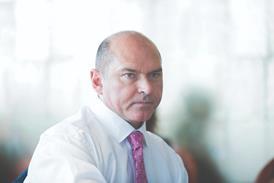Once published, the Francis report on how effective the NHS is at supporting staff who raise concerns at work must be required reading for all board members, commissioners, regulators and system leaders, write Rob Webster and Chris Hopson
The Francis inquiry and subsequent report in to the failings of care at Mid Staffordshire Foundation Trust may be seen as a watershed for the NHS.
In its wake have come a raft of whistleblowing stories that have carried concerns about the culture in some NHS organisations.
‘To deliver a transparent culture, we must built on the best and address the issues tainting careers’
It is important to acknowledge valid cases but if we focus on them exclusively, we risk drowning out the good practice that exists in many healthcare providers and local health systems.
To deliver a truly transparent and open culture, we must build on the best as well as addressing the issues that have tainted careers in high profile cases.
Wider scrutiny
Enter Sir Robert Francis QC, now examining how effective we are in supporting people to raise concerns at work.

‘With 1.4 million incidents raised by NHS staff every year, we have much to build on’
He has already talked openly and helpfully of the fear some people have about speaking up and that organisations may not be acting in the best interests of staff.
We also know of the strong correlation between engaged and empowered frontline staff and quality of care.
So it seems wholly appropriate that this review should scrutinise where organisations and the wider system are letting people down.
It must also consider where organisations are doing what should come naturally: to support staff who speak up and learn how to make improvements from feedback.
In a system where 1.4 million incidents are raised by NHS staff every year and where 97 per cent of staff say they report issues that arise, we have much to build on.
The challenges engaging staff
The NHS Confederation, NHS Employers and the Foundation Trust Network embrace the need for an open and transparent culture.
We were delighted that Sir Robert responded quickly to an invitation from the three of us to attend a roundtable event with a range of commissioners and providers, including trust chief executives and HR directors.
This provided an opportunity to learn about the work trusts are doing to support staff to speak up in order to improve practice and encourage learning.

‘We know from the amount of reporting that happens every day, the NHS is in fact very open’
The discussion also explored some of the knotty challenges that employers face in engaging with staff and responding to those cases that get played out in the public domain.
While politicians and the media often portray the NHS as a system lacking in transparency, we know from the amount of reporting that happens every day that it is in fact very open.
Everyone at our event was keen to emphasise the point that not only do they encourage staff to come forward with views, feedback and concerns, but also that the vast majority of issues and concerns raised by their staff are dealt with quickly, appropriately and are easily resolved.
Our biggest challenge - according to the annual staff survey - is making sure that staff feedback loops and confidence in management action is significantly improved.
Staff raise concerns every day. Not enough of them feel they are clear about the resulting actions.
Defining whistleblowing
Saying this can often bring calls that we are denying that serious issues exist. This is not our intention at all.
We all want clarity on the issues, the root causes and the solutions.
Despite the fact that we are moving in the right direction, it’s clear that there are a number of issues we need to address.
First of those being the use of the term “whistleblower”, something that has been conflated so that it now incorporates a range of things.
‘Negative connotations create fear and this prevents others from speaking up’
The media, politicians, trade unions and employers are all guilty of using a term meant to reflect someone standing alone fighting the system as a descriptor of someone who is encouraged to ask questions and receive open and honest answers. That is not whistleblowing.
That is the every day reality in many teams. It is the culture we strive for and achieve in our best teams. This is an important point.
These negative connotations create fear and, as Sir Robert himself says, this fear prevents others from speaking up.
We need to remove the stigma associated with what should be a normal practice and recognise it as an organisational asset rather than a liability.
Our members gave a range of examples where NHS organisations have embraced this culture of openness. One of our members told Sir Robert how his trust encourages staff to be “curious”, reinforcing positive connotations associated with asking questions.
- Why we need a staff support commission
- Francis’ whistleblowing inquiry is just the tip of the iceberg
- Protecting whistleblowers must be at the heart of NHS change
Another spoke of the fact that her organisation clearly stipulates at induction that raising concerns is part its culture and is clearly set out in policy too.
Another member spoke of the Virginia Mason “stop the line” system his organisation practises, where staff are encouraged to speak up when they think patient safety may have been compromised, reassured that they do so in a blame free environment.
Making it the norm
These are all great examples of an NHS in which the ethos encourages senior leaders and boards to be visible and approachable, where leaders recognise their staff are their eyes and ears for that organisation.
It is a health service that takes seriously the need for managers at all levels to properly engage with staff and be responsive to what they tell them.
The task now is to demonstrably make these practices the norm right throughout the health service.
‘There can be a lack of consistency about what regulators view as good practice’
Employers also tell us the system doesn’t always work for them – they feel bound by the legal process and confidentiality in ways that mean they cannot respond publicly to accusations in a timely manner.
Even when they are able to respond, they can feel damned by misrepresentation or reporting in what has become an increasingly punitive culture.
These issues make it difficult for organisations to engage with people who have made a conscious decision not to communicate with their employer before raising concerns in the public domain.
Outmoded HR rules, like the Department of Health guidance Maintaining High Professional Standards - guidance intended to provide clarity to employers when concerns are raised about doctors and dentists in the NHS, but which can actually confuse things further, contribute to delay and are felt by many medical directors to hinder resolution.
The role of regulators and commissioners adds further complexities.
Our members tell us that often there can be a lack of consistency about what regulators view as good practice when it comes to transparency, reporting and patient safety.
Fractious follow-ups
Providers also find that there is variation in the way commissioners follow up on concerns raised with them.
While there is plenty of excellent work taking place, feedback from our provider members tells us that sometimes the varying quality of relationship with clinical commissioning groups – and how well developed it is – can lead to big differences in how commissioners respond to concerns raised by staff employed by the organisations whose services they commission.
‘We need to build on existing good practice to create the open cultures we’re striving for’
CCG teams descending unannounced to busy wards demanding access to records and clinical leaders in order to scrutinise current practice can bring fractious relationships, rather than solve issues.
It is important that this review takes a proper look at how we – staff and employers – reflect and move on from reported concerns.
We need to build on existing good practice to create the open cultures we are striving for within the NHS, rather than layering on additional requirements, regulation and bureaucracy.
Once an outcome or agreement has been reached, there must be an end point in the process and clear and consistent feedback to the staff involved.
Again, there is variation in how well this currently happens across providers and other NHS organisations.
Take an honest look
The process may not always be straightforward and can be difficult for some people who may have been working towards retribution or justice over a long period of time.
‘Sir Robert’s report should be required reading for all board members, commissioners, regulators and system leaders’
Supporting staff – and their teams – to reflect on events is crucial in allowing people to move on, and to help the learning about how we improve the care we provide.
Once Sir Robert publishes his report and recommendations, they should be required reading for all board members, as well as commissioners, regulators and other system leaders, and will no doubt include actions that build the culture we seek.
We cannot let the opportunity to take an honest look at how we are performing in this area pass us by. The report must also build on best practice, rather than assume that failure is the norm.
Rob Webster is chief executive of the NHS Confederation and Chris Hopson is chief executive of the Foundation Trust Network



























2 Readers' comments